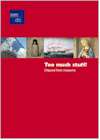Collections and cultural property
NMDC supports and represents members on a range of collections management and cultural property issues, sharing best practice across the membership and offering a forum for discussion and debate.
Restitution
Read case studies from across NMDC's membership of objects from UK museum collections being returned to their communities of origin around the world here.
Spoliation
NMDC recognises and deplores the wrongful taking of works of art that constituted one of the many horrors of the Holocaust and World War II. NMDC is committed to working with other institutions and organisations both within the UK and internationally to increase awareness and understanding of the facts surrounding the spoliation of works of art by the Nazis and others during the Holocaust and World War II period. Museums across the UK have undertaken detailed research of their collections to identify objects with uncertain provenance between 1933-1945. NMDC coordinated the first phase of this work to create a full searchable database of work with uncertain provenance. We also worked with our members and government to introduce new procedures providing provenance information of works coming into the UK for temporary exhibitions.
Acceptance in lieu and Cultural Gifts Scheme
The Acceptance in Lieu and Cultural Gifts Scheme provide the means for individuals to leave works of art and objects to the nation (and for those to be housed in public collections). The Cultural Gifts Scheme began on 1st April 2012.
The Acceptance in Lieu (AiL) scheme allows people to offer items of cultural and historical importance to the State in full or part payment of their inheritance tax, capital transfer tax or estate duty.
The Scheme is currently the most important means of acquiring important works of art and cultural objects for public ownership. Once accepted, they are distributed to museums, galleries and public archival depositories throughout the UK. The scheme is administered by Arts Council England.
Government Indemnity Scheme
The Government Indemnity Scheme (GIS) is an alternative to commercial insurance which allows the public access to objects within the UK that might not otherwise be available. The GIS is administered by Arts Council England and enables NMDC members to loan and borrow objects where it may otherwise prove too expensive to do so. For further information, and for the GIS guidelines, please see the DCMS website.
Too Much Stuff? Disposal from Museums
 NMDC published a report, Too Much Stuff?, about the subject of deaccessioning in 2003. This document was intended as a contribution to this debate and informed subsequent developments in museum policy regarding disposal of collections.
NMDC published a report, Too Much Stuff?, about the subject of deaccessioning in 2003. This document was intended as a contribution to this debate and informed subsequent developments in museum policy regarding disposal of collections.
The paper, produced by an NMDC working group and approved by NMDC directors as a whole, asked difficult questions. How do museums justify retaining collections which are not well used or even well cared for? Is it really always wrong, as the Museum Association Code of Ethics suggests, "to undertake disposal principally for financial reasons"? Is it always the case that the public interest is best served by retaining every object that has ever entered a museum within the public domain? Might not some objects provide more enjoyment to more people out of a store and in a collector's hands?
Members of NMDC recognise that the questions of acquisition and disposal of their collections go to the heart of what museums seek to, and are able to, provide. They also understand the importance of entering the debate on these issues while acknowledging both its complexities and current legal restraints.